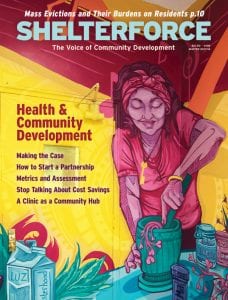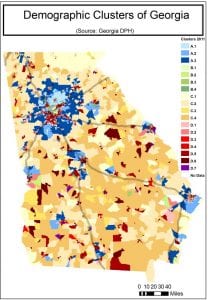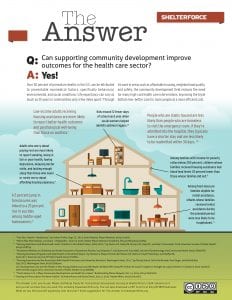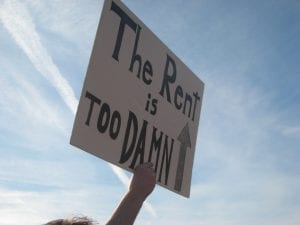
Topic
Community Development Field
Shelterforce considers “community development” to be an extremely broad term. But there are still many conversations about the ways in which that broad work happens. Comprehensively or in coalitions of specialized organizations? Locally or regionally? Place or people? While the answers to all of these are usually “both,” there are many conversations to be had about “how.”
The Latest

Criminalizing Homelessness: Supreme Court Case Gives Us a Chance to Change the Narrative
The Grants Pass decision will shape the way cities address homelessness in ways that may challenge housing advocates, but it also represents the best opportunity we've had in decades to change the narrative on homelessness and build stronger public will for housing.
Explore Articles in this Topic
Search & Filter Within this Topic
filter by Content Type
filter by Date Range
search by Keyword

Why Do We Care About Health Equity?
The fight for health equity—for everyone to have a roughly equal shot at the potential and choice that good health offers—is of course, similar to the fight for economic justice and the work of community development.

Not Just Partners, But Neighbors: Health Care in Affordable Housing Developments
Offering on-site health care in housing developments makes sense. But developing and managing housing and health care facilities can be very different. How do you make them work together?

Reshaping Housing Policy with a Health Lens
In Georgia, public health practitioners used a Health Impact Assessment to suggest changes to the allocation plan for Low-Income Housing Tax Credits. This is how they made it happen.

Financial Metrics Won’t Tell the Full Picture
Cost savings alone do not measure the full value of the collaboration between the health care and housing sectors.

Aligning Health Systems With Community Development
Hospitals and health systems can’t solve societal challenges alone. But they can play a key role in mobilizing and aligning joint resources to bring positive changes to low-income communities.

Approaching Partnerships Between Health Care Institutions and Community Development Organizations
There isn’t an exact science to forming partnerships. The slow and sometimes messy process requires patience, allies, and trust.

Q: Can Supporting Community Development Improve Outcomes for the Health Sector?
Yes! Over 50 percent of premature deaths in the U.S. can be attributed to preventable non-medical factors, specifically behavioral, environmental, and social conditions.

What If We Didn’t Have to Beg for Community Benefits?
Perhaps publicly owned land should be developed for the community first—and market-rate developers should be asking us for access to part of it.

Shelter Shorts—The Week in Community Development, Feb. 2
Quote of the Week: “Even as the core problem in cities shifted from disinvestment to displacement, the policy paradigm has remained the same: Spur growth in an area starved for […]

Who Gets to Live Where, and Why? The Answer May Be Settled By Our Narratives
Why housing messaging is backfiring and recommendations on how to change course.

Shelter Shorts—The Week in Community Development, Jan. 26
Bus Routes Out of Poverty | Amazon—Earn Your Subsidy | The Numbers Behind ‘Urban Renewal’ | Overdue Rent is Sickening | Med. Students As City Planners? | Trump’s Medicaid Work Requirement

Moving Hospital and Health System Investments Upstream
Across the country, nonprofit hospitals are under intense scrutiny due to the discrepancy between the substantial revenues they generate compared to the level of support they provide to neighborhoods that […]
